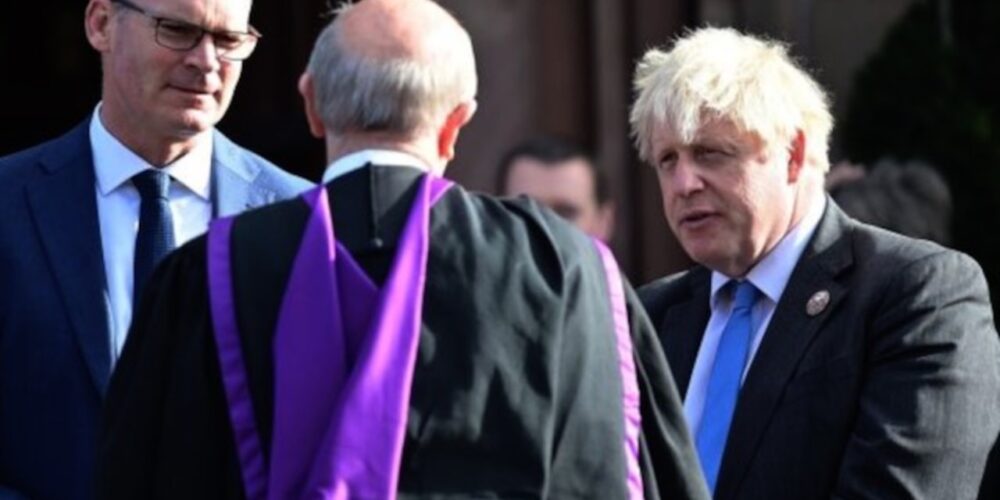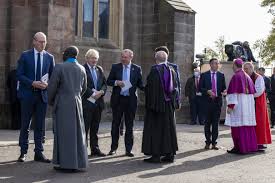What on earth was that event last month in St. Patrick’s Cathedral, Armagh, all about? We were told that it wasn’t a celebration of partition, nor a commemoration of the hundredth anniversary of the foundation of the Six-County political entity. Rather, it was – the organisers informed us – an occasion to reflect on and mark the formation of Northern Ireland and, thereafter, offer hope for the future.
 |
Yet in spite of the highfalutin talk that preceded the service, little or nothing of substance was said during the event: no serious or incisive reflection on the nature of the brutal and sectarian Northern state; no concrete proposals on which to base hope for the time to come; no good reason offered for why the North’s non-unionist population would care to mark their abandonment by Dublin and decades of subjection in an Orange state.
Nevertheless, and notwithstanding the notable absence of Michael D. Higgins, Queen Elizabeth II of England, and Sinn Féin, the ecumenical church service for partition was attended by a number of senior political figures. The British prime minster, Boris de Pfeffel Johnson, the leader of the SDLP, Colum Eastwood, the first minister, Paul Givan (DUP), and Simon Coveney and Jack Chambers of the Dublin government were among the elected representatives who joined the congregation.

All very anodyne and harmless, one might say. And one would be wrong; because the Armagh event was not only a power play by the establishment, North and South, but also revealed a deep-seated insecurity that affects the ruling class in both jurisdictions.
Displaying their ability to mobilise the secular authorities and oversee the entire event were the five main Christian churches in Ireland, fronted at times by the unctuous Eamon Martin, Catholic Archbishop of Armagh. Having taken a well-deserved trashing over recent decades, the Catholic Church was anxious to flex its muscles. It could take some satisfaction not only from the fact that it had been party to convening a powerful gathering in Armagh but that very day had also influenced Sinn Féin and the SDLP to abstain on a DUP motion delaying the introduction of abortion legislation in the Six Counties.
Simultaneously we were treated to the spectacle of the Fianna Fáil and Fine Gael coalition demonstrating its authority by rejecting the lead set by President Higgins when he refused to attend. They were joined in the cathedral by the SDLP, trying to appear indifferent to censure by their critics in Sinn Féin; and then there was the Tory prime minister, Johnson, flaunting his unionism while emphasising his mandate to govern Britain’s Irish colony.
So, steady as she goes, there. The ruling class throughout the country can breathe a sigh of relief; and with church and state in such close embrace the status quo is surely set in concrete.
But is it? Was this pantomime the display of a confident and secure established order? or was it another desperate gambit to prop up and maintain, for as long as possible, partition – an institution that remains essential for the sustainability of two failed states and the privileges reaped by beneficiaries of this debased system.
The 26 Counties is far from the confident political entity that its governing bodies like to portray. The neoliberal free-market economic model to which the Southern state slavishly adheres has created a housing crisis, a costly two-tier health service, and repressive industrial relations legislation, along with gross and growing inequality among the citizenry.
Consequently, Sinn Féin is leading in the opinion polls, because so many want to change this broken model. Whether Sinn Féin is capable of answering the need for fundamental change remains in doubt. The party’s support for the EU, coupled with its economic spokesperson assuring big business of a safe future, raises the question of what exactly they might change.
Meanwhile, north of the border, the very political institutions are in constant jeopardy, and the constitutional position of Northern Ireland within the United Kingdom has never been less secure. Unionism is fractured, demographic changes are threatening the Union; and, in spite of Johnson’s jingoistic posturing, the British establishment cares little for the North, as evidenced by its willingness to sacrifice it in order to “get Brexit done.”
Attempts are being made in both jurisdictions to contain discontent, or neutralise demands for a better alternative. Their efforts are nevertheless failing to definitively address the issues, because of the impossibility of squaring so many circles.
An adequate supply of housing, a national health service or progressive legislation guaranteeing workers’ rights would go some way towards restoring the fortunes of the Republic’s coalition government. Yet none of these remedies is compatible with strict adherence to free-market dictates, nor would they be in accord with EU regulations regarding state aid, a dilemma epitomised in the person of that master of inertia and indecisiveness Micheál Martin.
Further north we have the hand-wringing of the SDLP in one corner and the UUP, their unionist counterparts, agonising in the other nook. Both recognise that the world has changed from the days of Basil Brooke and Bill Craig, yet both are incapable of acting decisively in the light of the new dispensation lest they unsettle their middle-class electorate. The DUP, naturally, is not afflicted with any such ambivalence, but seemingly Oliver Cromwell is refusing to return their calls.
In essence, the situation on both sides of the border is unsettled. Nothing near breakdown or anything close to an existential crisis, yet the establishment has cause for concern. Political equilibrium is finely balanced at the moment and is unlikely to withstand something as transformational as the ending of partition, accompanied inevitably by a plethora of measures necessary to accommodate the change.
A national health service free at the point of entry would undoubtedly be an unavoidable demand, as would public housing; and, in order to address years of sectarian segregation in the field of education, it would be imperative to remove church influence from the classroom.
Such a scenario would clearly alarm the ruling class, its supporters and its ideologues, both secular and religious, on each side of the border. It would also disturb the hedge funds, vulture funds and transnational corporations operating here, which, incidentally, are a crucial source of income for many in the most privileged strata of society.
Little wonder, therefore, that conservatives of every hue and persuasion from around the country would congregate in St. Patrick’s Cathedral in Armagh to pray that partition might endure and that they be delivered from a spectre haunting them: the spectre of a democratic and progressive Ireland.
Now all the powers of Old Ireland have entered into a holy alliance to exorcise this spectre: archbishop and prime minister, Frost and Coveney, British Labour Party and the Special Branch.
That, in reality, was what the Armagh prayer service was all about. What can one say but – well, Amen.
 |
Tommy McKearney is a left wing and trade union activist. He is author of The Provisional IRA: From Insurrection to Parliament. Follow on Twitter @Tommymckearney |






And what also slipped under the radar, with the exception of direct rule, for 100 years unionist politicians have maintained control of the ministry of justice, albeit, now with SFUK's support.
ReplyDelete